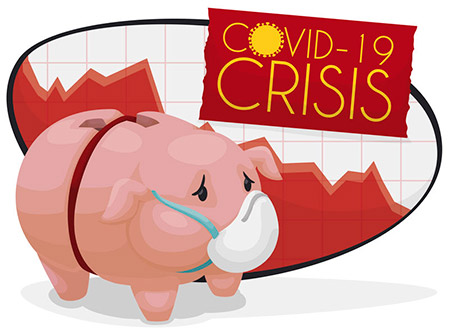
For many, it was a year of hardship, for some a year of opportunity… for almost all, a year of change. COVID-19 has changed our lifestyle, the way we go to the grocery store, the way we take our kids to school, how we interact with our families, and how we work.
Many of you likely found yourself either working from home part-time or full-time; maybe you had never done so before? Some handle it better than others, and some of us can focus while others struggle. It can be a challenge to stay on task at times being surrounded by family and other distractions.
When considering working from home versus being at the office, one thing that came to mind was viewing my job as a business. We work to make money, so doesn’t it make sense to account for all of the costs? How much it costs to get to our jobs, buy supplies for our jobs, dress for ours jobs and the after-hours overtime we spend on our jobs?
All of these changes have had an impact both positive and negative on our household budgets. 2020 has made it difficult to predict what sort of spending we’d be doing as well as what our total income would look like, with some potentially being laid off and losing a job, while others thrived on niche opportunities.
2021 is definitely a good year to re-assess your budget and your spending, whatever your situation may be. Below is a summary of some of my own personal budget categories as well as some suggestions on how working from home during COVID-19 can actually save you money.
Our Household Budget

I found it very difficult to estimate how our annual budget would look in December on the expenses side. Doing different activities than normal throughout the year, being home so much, eating more food, not seeing friends or playing sports, changed our spending habits. While spending totals for certain categories were unpredictable, I assumed that overall our spending would be down considerably. Was it… ? Well, yes and no.
Savings vs. Additional Spending
Below is a summary of most of our family’s own personal budget categories and how they fared in 2020. Any Increases in our costs from the previous year are highlighted in RED and Savings compared to last years’ spend are highlighted in GREEN.
I’ve also noted some of the potential advantages or disadvantages realized from COVID-19 and working from home. Factoring these costs into your take-home pay may have you re-assessing the need to work so many hours or perhaps even re-considering the job situation you’re currently in.
COVID-19 Budget Numbers
Grocery: 17% Savings
I’m a little surprised at this number, as it feels like we’ve been spending more on groceries, particularly the last couple of months – in fact I’m sure we have. I have no doubt food costs have risen lately, so I’d attribute our savings to simply being more mindful and making a concerted effort to cut our grocery bill. The Wal-Mart price matching really helped cut costs, while it was still available. We also took advantage of some credit card offers such as the American Express Personal Platinum Card’s $250 statement credit towards grocery purchases.
Work from Home Advantages/Disadvantages: Working from home likely increased food budgets moderately as you may not have access to that free office breakfast or are simply eating larger quantities with the luxury of staying home.
Verdict: Probably an increase in budget for most.
Fast Food: 15% Increase
I usually track fast food and take-out separately from our grocery budget and separate from formal dinners/restaurants as well. Basically, having a dedicated “fast-food” column gives me a definitive number that I can cut from our budget 100% if I ever needed to. That and it gives us an idea of how much junk we’re eating. Somehow we managed to spend more this year, but I believe being at home and ordering a few more take-out treats and purposefully spending to support local restaurants and businesses accounted for this.
Work from Home Advantages/Disadvantages: I feel like we aren’t the norm in this case, and many people probably saved a bunch of money this year by eating out at restaurants less or not buying coffees in the morning on the way.
Verdict: Working from home will most likely save you money on fast-food and treats over the course of the year.
Home Insurance: 2% Increase
Home insurance went up marginally; it usually does every year. Some people were surprised since you would think being home all of the time would imply less risk in terms of burglaries, theft etc. At the same time, insurance companies contend that being home more often increases the risk of things like house fires – makes sense, I guess!
Work from Home Advantages/Disadvantages: Working from home may not help you save on home insurance, but you’ll likely be able to write off a portion of your supplies or even your home office space if you’re self-employed. The CRA introduced an easier way for eligible employees to claim up to $2/day to a maximum of $400 in home office expenses.
Verdict: Tax credits are likely in the cards if you work from home during COVID-19.
Auto Insurance: 22% Savings
Our car insurance went down a fair amount, but I wouldn’t say to the degree I would have expected. I find I’ve been doing very little driving compared to normal in the past couple of months. Our insurance gave a general 15% discount for COVID-19, and I believe we also got reduced rates, just because they get a bit lower each year with good driving habits. We also purchased snow tires for another 5% in additional savings.
Work from Home Advantages/Disadvantages: Less driving and less time on the road equals less risk. Your insurance company will likely have lowered your rates if you are working from home or driving less. If not, contact them to see what they offer.
Verdict: You should be able to save at least 15% on your car insurance if you’re working from home at least part-time during COVID-19.
Medical: 1% Increase
Not much to see here, pretty much the same expenses as last year. This category usually accounts for things that we pay for out of pocket, such as prescriptions or dental bills that aren’t covered by provincial healthcare/insurance or benefits.
Work from Home Advantages/Disadvantages: I’m not sure there will be a lot of difference with this budget category, except that it may be more difficult to schedule medical appointments with longer wait times or if you had the unfortunate experience of contracting COVID-19.
Verdict: Probably not a lot of savings potential.
Daycare: 76% Savings
As much as I know my daughter misses going to “school”, it does put a bit of a smile on my face to know we’ve saved a ton of money on one of our largest expenses this past year. Being at home with kids full-time is no cakewalk, though. I remember one of our friends joking that he could buy a brand new car every year if he didn’t have his two kids in daycare full-time. Actually, now that I think about it, I don’t think he was joking.
Work from Home Advantages/Disadvantages: I’m not sure it’s advantageous to have your kids home all day while trying to work. However, it is an advantage from a financial position if you can still manage to earn your living while not going crazy.
Verdict: If you have pre-school aged children or younger, a massive amount of money can be saved on childcare expenses if you are working from home.
Cable/Internet: 25% Increase
Unfortunately, our cable “deal” rolled over this year right around when the first lockdowns started. I had planned to switch providers to save money, but then didn’t bother as we didn’t want anyone in our house at the time, then never got around to switching. We ended up paying a little extra for most of the year, but recently I called and got our cable bill reduced (once again) to a cheaper rate for 2021.
Work from Home Advantages/Disadvantages: Being home more often will likely result in the urge to watch more television and possibly subscribe to more channels or services.
Verdict: I wouldn’t be surprised if this was a budget category that got a little inflated for many people during COVID if you take into account additional TV subscription services.
Hydro/Water: 23% Increase
I suppose being home all the time, this one shouldn’t come as a surprise. The province of Ontario also did us the “favour” of reducing peak electricity rates during COVID but at the same time raised the off-peak rates. We usually rely on those cheaper times to do our laundry, dishes, baking etc… Overall, I’m not pleased with the rate hikes, but not surprised either that we’re using more electricity working from home.
Work from Home Advantages/Disadvantages: You’ll be using more energy for sure working at home, having lights on all day and your heat or A/C on higher.
Verdict: Definitely a category you can expect to see rising costs if you’re working from home for any extended period of time.
Heating/Gas: 25% Increase
Like Hydro/Water, while we have tried our best to cut heating bills, this increase is not unexpected. We’re probably heating the house a bit more being home most of the day versus using a smart thermostat to lower the temperature during times we’re away. That seems like rarely these days.
Work from Home Advantages/Disadvantages: It’s hard to type with cold fingers, believe me. So you’ll likely see a bit of a bump to this budget category.
Verdict: Similar to the last, if you’re home more, you’ll be paying more.
Car Repairs/Tolls/Expenses: 58% Savings
I generally separate our car expenses into three categories: Maintenance & Repairs, Tolls/Transit and Gasoline/Fuel. The differences in savings between these sub-groups were all within about a 10% margin, so I’ve just lumped the three together. Our overall automotive budget decreased by a substantial amount in 2020, thanks to staying home much of the time and fewer activities and gatherings to attend.
Work from Home Advantages/Disadvantages: Anyone not driving to the office every day or even commuting to the public transit lot will most likely see a decrease in automobile expenses.
Verdict: Big savings can be realized working from home in the way of gas, transit passes and even car maintenance.
Recreation/Gifts/Miscellaneous: 16% Savings
This is one category that I honestly could breakdown a bit better, but I don’t have the time or inclination to do so. This is where I include things like our recreation/sporting activities, personal purchases, travel, clothing and fun stuff. Usually, one of our biggest categories since it’s not broken down well and includes categories that could be standalones for many people. This was only down 16% this year, which surprised me, but I think we spent a bit more on items for the home this year, and it may have offset clothing, activity and travel savings somewhat.
Work from Home Advantages/Disadvantages: Less travel/vacation, less in the way of sports and recreation for the family, fewer clothes needed for work… this category is another winner for your budget.
Verdict: Most people should have spent less in this category in 2020. Many opportunities to spend in this budget category were simply off the table this year.
Home Maintenance: 54% Savings
Our home repair budget was actually down 86% from last year, but I didn’t think that was a fair comparison because we had our roof re-shingled in 2019, and it was expensive! So I’ve set the comparison of this year’s budget to our average maintenance over the past 5 years. With that in mind, we still spent 54% less this year on home maintenance. Being home so much, I’ve been able to take care of any maintenance issues on my own or just put off certain tasks since we’re not keen on having strangers into the house until the virus goes away.
Work from Home Advantages/Disadvantages: Being home more often and likely saving on commute time should free up some time for other things. If you’re handy, that could be home maintenance.
Verdict: You can absolutely save in this category by taking care of your own basic maintenance. However, many people took advantage of the time off to take on home renovation or upgrading projects and likely spent more than usual in 2020.
Lessons Learned
COVID-19 has most likely lightened many people’s budgets as large expenses like travel/vacations, childcare, dining out, sports activities are just not available in the sense they would normally be. Most people are travelling locally way less as well, using less gas, paying less for gas, less for insurance and saving time commuting.
If your family’s budget has realized a good amount of savings during COVID-19, while still managing to work your regular hours, you are ahead of the game. Perhaps the savings will prompt some to realize that you can actually live on less than you thought. Maybe you don’t need to work as many hours as you thought. A lot of us have used this time and opportunity to re-examine what is most important in our lives – and considered that going to work for 60 hours a week just to pay for shiny new things and fine dining, might not actually be the best long-term strategy.
Budget Going Forward
One of the biggest questions if we can finally move past the pandemic, is how will most people’s spending evolve? Will we take the lessons learned to heart, or go back to our normal lives and spending habits?
My feeling is most will revert to the norm, but some of us will come away with a fresh perspective. Hopefully we can carry over these newfound insights and develop more purposeful spending habits, while enhancing the important aspects our lives going forward.




I’m shocked you have managed to keep your food spending so stable. Our grocery bill AND fast food are both up significantly compared to before COVID. However, our restaurant spending is way down. We try to get take-out from one restaurant per month to help support them, but this means we’re spending far less than when we would go for dinner and drinks with friends.
I’m curious to read about your experience getting your roof shingled. If you didn’t blog about that, you should! Many of your fellow homeowners are curious about what they’re getting themselves into having something like that done.
To be fair, I think we overspent a bit the previous year before COVID, at least comparatively to where I’d like to be. There were also a couple credit card deals we used for free groceries. The WalMart price matching was actually a huge help I think too, being able to get the best sale items in one shop. I’m not bothering with that now because of COVID. Don’t need to visit 3 grocery stores to save $20.
I think that’s actually a great idea for a blog post as well (roof replacement), I’ll just have to figure out how to structure it and if you have any suggestions or questions about things you’d like to know, I’ll try to include them.